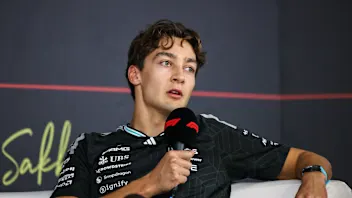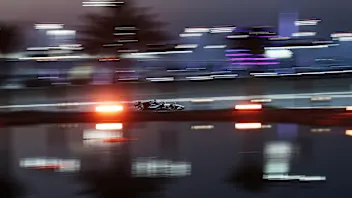Much of Formula One racing, including Takuma Sato’s own ascent into the sport, relies upon the art - or lottery - of being in the right place at the right time. But just six races into his F1 career, Sato found himself in entirely the wrong place and at precisely the wrong time. Totally helpless as he was speared by Nick Heidfeld’s out-of-control Sauber, Sato was extremely lucky to emerge unscathed...
“I remember everything about the accident,” Takuma Sato reflected after been released from an overnight stay in hospital. “I was turning into the corner with Juan Pablo Montoya almost alongside me. I was just starting to get on the throttle when I had the big smash. I heard a big bang and shut my eyes..."
Even prior to Austria, it hadn’t been the most auspicious of starts to a debut F1 season for Sato.
The Japanese driver had broken into the sport with no little fanfare, having claimed the British F3, F3 Masters and Macau F3 crowns in 2001 - a treble that has never been matched before or since. Bolstered by several impressive tests for BAR, he was billed as the brightest prospect yet to emerge from Japan.
Having duly beaten Jean Alesi to the right to partner Giancarlo Fisichella at Jordan, Sato started last for his first Grand Prix (the legacy of a crash on Saturday morning), collided with his team mate in the second, and suffered retirements in races four and five, the latter of his own making.
By Austria, rumours were beginning to swirl about team boss Eddie Jordan looking at other options. The pressure was beginning to mount.
Sato qualified 18th - three spots and little more than 0.1s down on Fisichella - for the race, and quickly moved up to 14th once the lights had gone green. He remained there when the safety car was called on lap 23, and was one of only four drivers to take the opportunity to pit. Although he could not know it, it would prove a fateful decision.
Three laps later the race restarted and Sato, out of position following the stop, was immediately swamped by the frontrunners. Montoya, running fourth, was the immediate concern, with Sato giving the Colombian the inside line at Turn 2. Still, Sato was half a car length ahead at the apex - and that left him in the firing line.
Further down the road, Heidfeld - under pressure from David Coulthard in the fight for fifth - had got his braking horrendously wrong.
"After the first safety car incident Coulthard and I were side-by-side going down to the hairpin," Heidfeld explained afterwards. "I saw a cloud of tyre smoke as [Alex] Yoong braked really hard and early ahead of us, and maybe I pressed the pedal too hard as a result while the brakes were still cool.
"The car got away from me and next thing I knew I was going backwards down the grass.”
At high speed, the German flew straight into the side of Sato’s car, causing massive damage.
“I didn’t see Heidfeld coming at all,” Sato added. “When I opened my eyes I could see my legs were squashed by the damaged monocoque and I could see the ground through the hole.
“Although there was some pain, I knew nothing was broken. The car did a great job of saving me - I hear there was nothing left of it.”
Indeed, so bad was the collision that Heidfeld had to be carried out of his car, while it took around 10 minutes to safely extract Sato from his wrecked shell.
"I was worried for a while there... I saw him pumping his heart,” team boss Jordan told British TV. “But he's down there, he's talking and fingers crossed he's not even broken a bone. It would appear there are no injuries at this time.
"[FIA Safety and Medical delegate] Professor [Sid] Watkins said that was the biggest miracle he's ever seen.”
It was not the only dramatic moment of what would prove a contentious Grand Prix.
Rubens Barrichello had led all but one lap, but as Ferrari team mate and championship leader Michael Schumacher closed in, there was increasing concern that he might be instructed to cede position.
Within sight of the chequered flag, the Brazilian did just that - and Schumacher claimed one of the least celebrated of his 91 Grand Prix wins.
Next Up
Related Articles
 HighlightsCatch the action from Day 3 of the second Bahrain test
HighlightsCatch the action from Day 3 of the second Bahrain test Mercedes ‘need to improve reliability’ – Russell
Mercedes ‘need to improve reliability’ – Russell/16x9%20single%20image%20-%202026-02-20T181924.153.webp) What we learned from Day 3 of the second Bahrain test
What we learned from Day 3 of the second Bahrain test/Antonelli%20Bahrain%20Test%202.webp) Who’s driving on Day 3 of the second Bahrain test
Who’s driving on Day 3 of the second Bahrain test HighlightsCatch the action from Day 2 of the second Bahrain test
HighlightsCatch the action from Day 2 of the second Bahrain test What we learned from Day 1 of the second Bahrain test
What we learned from Day 1 of the second Bahrain test